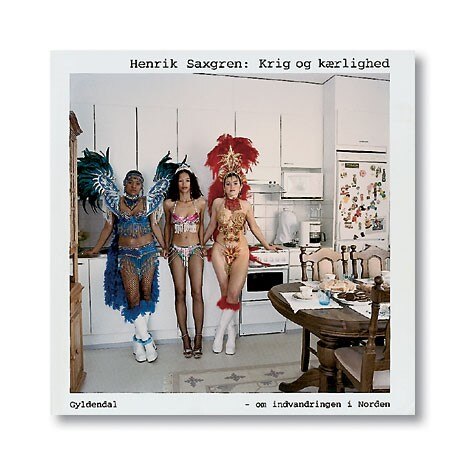Krig og kærlighed - om indvandringen i Norden, Henrik Saxgren Gyldendal, Gylling 2006 (pp. 272, s.i.p.)
“Fak Danish People” is sprayed on a flaking wall – the only contentious sign. But suppressed anger can be seen in many of the homesick gazes of the host of people portrayed. Anger or frustration. Something against their host country that although (or because) not mentioned, is tangible.
Two hundred and fifty-three immigrants. North Africans carrying huge frozen fish. Sri Lankan, Turkish, Afghan and Iraqi families. Each unit is shown in its model mini-apartment, all wood and Ikea furniture. Barefoot Iranian women beside coffee tables covered with remote controls and mobile phones. North American Indians, Israelis, Lebanese. Closets filled with furry animals. A young black policewoman, 22 years old and originally from Uganda, with a sinister squad of Danish colleagues. Three Brazilian women dressed for Carnival, with tall feathers on their heads and bare thighs and midriffs – very sexy. A pale but proud priest holds hands with his young Thai bride. More mixed couples, wan Scandinavian women and Mali, Egyptian and Mozambican men. Next to so many foreigners, the shy blondes blessed by the fortune of having encountered so much life – they, the Danes.
Every photograph tells a story with a plot running along routes that shift from Istanbul to Aarhus, from Nairobi to Jutland. Surfers from Barbados who have landed on the North Sea; Croatian women holding sorrowful ice-cream cones that are about to melt away, just like their expectations.
With unintentional but impressive timing after the tornado of the anti-Islamic satirical cartoons of Danish origin, Copenhagen publisher Gyldendal has brought out a photographic portrait book entitled Krig og kærlighed – om indvandringen i Norden. The story of immigration to Denmark over the last 40 years that seems anxious to show that globalisation is nothing but an artifice conjured up by colonialist imagery to legitimise its own identity. And that, instead, the world has indeed become smaller but is by no means all the same. If it is possible, the distances are now even more painful, because when physically separated from your land of origin, specificity is not only conserved, it is amplified. It is a mystery why (it is certainly not for genetic reasons, more likely collective psychology) homesickness is present in the eyes of children who have never seen those lands. People from monarchical countries pose for photographs with photo murals of their kings behind them. The shoes and garments of those photographed are strictly Scandinavian in style, but the kitchen tables unmistakably show the leftovers of oriental foods floating in the dishes.
The nostalgia transpires not so much from the physical traits and much more in the photographs of the surroundings. It is these places of immigration that are far more striking and painful than the protagonists. Internet points, telephone boxes and coin-operated laundries. The unexpected, transversal lights that fall on the flat Danish countryside, kissing the ground almost as if wanting to offer a chance, a tiny piece of freedom. Restaurants and bars of various ethnic groups in the nothingness of monotonous and frozen plains. Marginal worlds that have gained legitimate statutes of existence thanks to a seemingly civilised society but that, as our most recent contemporary history tells us, see two-sided ambiguous recognition behind this generosity (you may exist but you do not for me) which inflicts discrimination, fuels conflict and ferments crazy ill feeling. Between the lines of the tireless story of the people and their surroundings, this book by Henrik Saxgren conveys a crushingly difficult, difficult to interpret, hard to admit and, of course, intolerable complexity.
Lisa Ginzburg Writer and journalist


